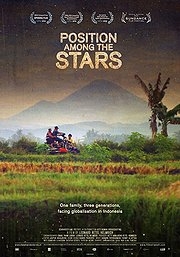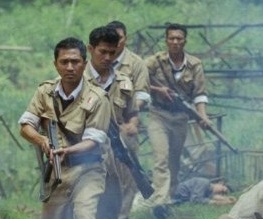Position Among the Stars

The final part of Dutch director Leonard Retel Helmrich’s Indonesian set trilogy, Position Among the Stars re-introduces the audience to the Sjamsuddin family as they survive amongst the poverty of the Jakarta slums. The director, who’s family repatriated from Indonesia to Holland before the second world war, has been hailed in the past as the man who perfected the “Single Shot Cinema” technique of documentary journalism, a method of fluid camera work which allows entire scenes to be recorded in a single take yet still captures the action from numerous angles.
The film follows three generations of the family – Rumidjah the elderly matriarch, her sons Bakti and Dwi and her teenage grand daughter Tari. Bakti is the local neighbourhood manager, an unpaid position which puts him in charge of doling out slim government welfare amongst his neighbours. The rest of his time is, of course, spent raising and training fighting fish for gambling purposes, a hobby that infuriates his wife as she spends her days cooking and selling food from the porch of their small, slum home. Bakti also has responsibility for Tari, his niece, her parents having died during her childhood. A bright, sharp though occasionally sulky teenager, Tari’s recent graduation from high school has given the whole family hope that one of their kin will finally escape the poverty which has long held the family in its grasp. Most hopeful of all is Rumidjah who seems willing to invest her entire being in the success of her granddaughter.
Bereft of voice-overs, title cards and interviews, Position Among the Stars presents a strikingly different account of life among the impoverished inhabitants of one of the world’s largest and most overcrowded cities. Helmrich’s camera, free from both the rigidity of the tripod and the hyperactivity of fly-on-the-wall, searches and probes each scene for emotional and dramatic weight. It moves from participant to participant, locating and focusing upon the most subtle of expressions, allowing the significance of each small drama, each brief comic aside, each telling exchange of glances to inhabit the film’s foreground. In the hands of a less assured director this material could have been an aghast, hand-wringing slice of poverty-porn but Helmrich’s focus on the people as opposed to the facts of their situation extends Position… far, far beyond that.
His commitment to this technique does, however, open certain sections of Position… up to question. While there is never any doubt that these are real people in real situations feeling real emotions, there are certain sequences and certain exchanges of dialogue in Position…which appear very much planned and rehearsed. Does this make it a less authentic account of life in the Indonesian capital? Probably not, but it does make one wonder about the veracity of some of the film’s most dramatic flashes. When Bakti disciplines Tari or rows viscously with his wife the shot pattern feels almost too perfect, the symbolism almost too apparent.
When Helmrich’s techniques do succeed, however, Position…paints a startling portrait of a country up for grabs. While it may no longer be gripped by the authoritarianism of the past, Indonesia is presented as having a deeply uneasy relationship with its new Democracy. The society is the centre of a power struggle, a collision point for different powerful forces with potentially dark motives – on one side Jihadism, on the other all-consuming Westernisation, on another Christianity and another secular Islam. These forces take particular interest in the hearts and minds of the young who they will shamelessly bribe, cajole, threaten and blackmail for their loyalty. All this conflict and philosophical warfare hangs on the head of young Tari. A high school graduate from a part of the world which produces few, Tari’s burden is not just the hopes, fears and dreams of her expectant family but the hopes, fears and dreams of Indonesia. What is all the more tragic is that her main ambition seems to consist of little more than being a sulky teen who hangs out in shopping centres, surfs Facebook and experiments with motorbike riding boyfriends – in short, to be a normal teenage girl like any other teenage girl in the world. Yet her intelligence, her ambition and the apparent moral responsibility of her family mean she cannot be that. There is simply too much riding on her success.
With Position…Helmrich has completed his trilogy with a potent, perceptive rumination on the changing nature of his family’s homeland. If, at times, it wanders into questionably dramatised territory, that is made up for by the sheer impact and power with which Helmrich delivers his vision.






Recent Comments